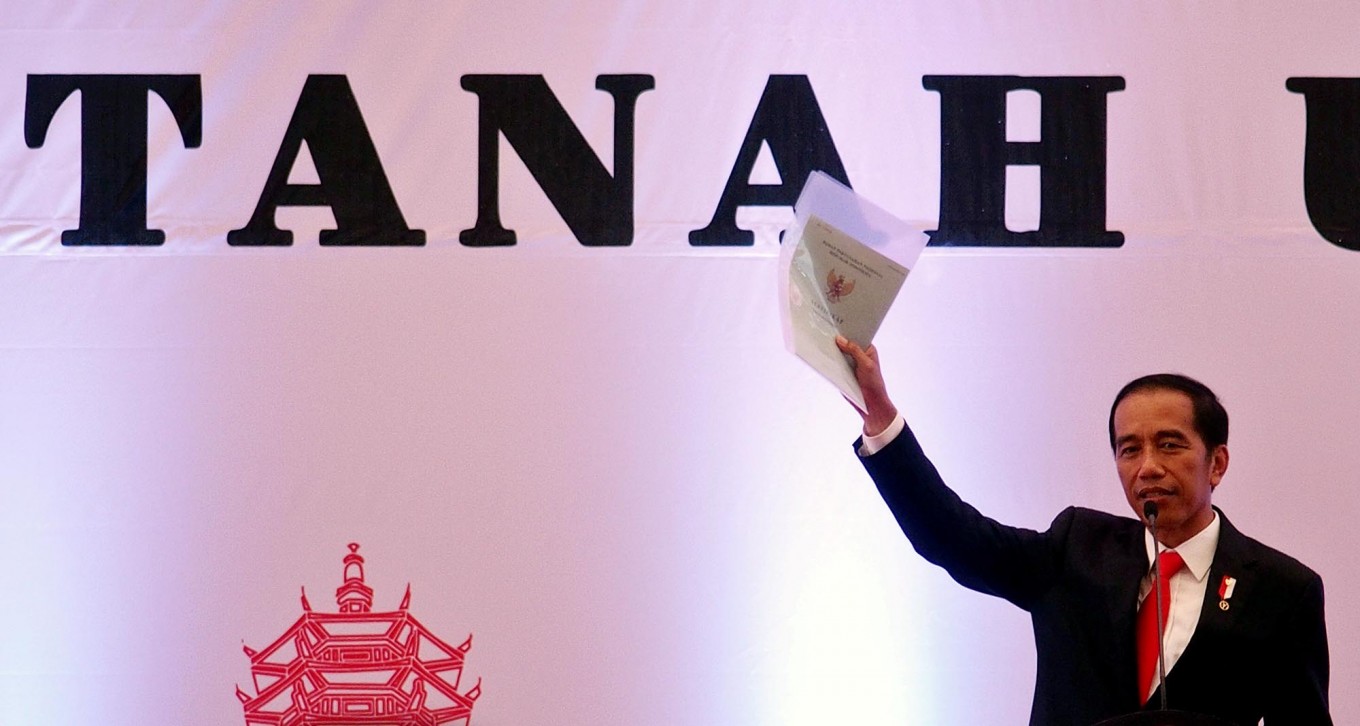Popular Reads
Top Results
Can't find what you're looking for?
View all search resultsPopular Reads
Top Results
Can't find what you're looking for?
View all search resultsJokowi denies claim he becomes economic nationalist
Change text size
Gift Premium Articles
to Anyone
I
ndonesia will turn to private investors for the hundreds of billions of dollars in investment needed to develop the archipelago’s infrastructure and natural resources, President Joko "Jokowi" Widodo said, brushing off claims he was increasingly becoming an economic nationalist.
All major projects will be offered to the private sector, Jokowi, told Bloomberg Television’s Haslinda Amin on Saturday in an interview on a hilltop overlooking the picturesque Lake Toba. Government companies would partner with private investors only if there wasn’t enough interest among such players, with funding from the national budget the last resort, he said.
Halfway through his term in office, Jokowi is seeking to balance the need for more foreign investment with pressures at home to keep the economy, especially its mineral resources, in local hands. A dispute between the government and Freeport-McMoRan Inc. over the transfer of majority ownership of the US miner’s Indonesian unit demonstrates that challenge, while also stoking concern that investors may turn their back on the country.
“Is Indonesia a protectionist? No. We are open for investors,” Jokowi said in the interview. “We have cut the negative list to allow more foreign investors. It shows that Indonesia is open.”
Jokowi has attempted to wean the country off commodities and push investment in value-added manufacturing and services to emulate the success of countries like South Korea. He wants mining companies to build smelters rather than export raw commodities, and divest majority stakes in their businesses.
Read also: Era of selling natural resources has ended: Jokowi
While that nationalist strategy may help his prospects of being re-elected, it’s also undermining efforts to generate more jobs and boost growth. Newmont Mining and BHP Billiton pulled out of Indonesia in 2016, and DP World, the Dubai-owned company that operates ports from China to South America, said last month it won’t renew a concession to jointly operate a terminal in the Southeast Asian nation beyond 2019 as conditions set by the government weren’t favorable.
Budget Pressure
With a legal cap on the fiscal deficit of 3 percent of gross domestic product, and revenues under pressure, Jokowi needs foreign investment to finance his ambitious infrastructure plan. The World Bank estimates Indonesia will need $500 billion over the next five years to build roads, ports and bridges.
While 5 percent economic growth is “good,” the government will continue to pursue the 7 percent goal, Jokowi said. Faster growth was the best way to generate more jobs and increase per-capita income of the country’s 260 million people, he said.
Read also: BI expects Q2 economic growth of 5.1%
Jokowi, who completes three years in office this week, rode to power on a wave of political nationalism, pledging to renegotiate contracts with foreign companies. He recently ordered stricter enforcement of a policy requiring manufacturers use more local components, saying the rule was needed to reduce dependence on imports and encourage investment in factories.
At the same time, he’s implemented some business reforms to lure investors. He’s pledged a one-stop shop for approvals to speed up projects and allowed full foreign ownership of businesses, such as those operating toll roads, cold storage and cinemas.
Business Reforms
That’s helped Indonesia steadily improve its ranking on the World Bank’s ease of doing business index -- jumping 18 places to 91 this year. But regulations around land acquisition and permit processes continue to hold back investors, with only about a third of domestic and foreign investment pledges actually realized, according to government estimates.
Jokowi said the government isn’t done with reforms yet and will review labor laws.
“We will continue to have more sectors open for foreigners to invest their money in Indonesia,” he said. “Indeed, our focus is still on industry, manufacturing, film, theaters and creative industry. There are many and the most important is tourism, we will also open it.”
After agreeing in August to hand over a controlling stake in its Grasberg mine to the government, Freeport has been at loggerheads with authorities over how to value the miner’s Indonesian unit.
Read also: Freeport agrees to 51% divestment, other terms: CEO
Jokowi said he expects to conclude a “win-win” deal with Freeport in three months. The wrangling over the ownership and license hasn’t discouraged investors, he said, adding that foreign companies continue to make fresh investment in sectors including nickel.
Another possible deterrent to investment is the dominance of state-owned enterprises in the economy. World Bank President Jim Yong Kim said in July that Indonesia should lower its reliance on state firms to undertake projects and instead tap the private sector and foreign funds to finance them.
Jokowi said he’s ordered the State-Owned Enterprises Ministry to shrink the number of public companies running everything from airlines to gasoline stations and salt factories to 130 from about 800 by merging some of them.










